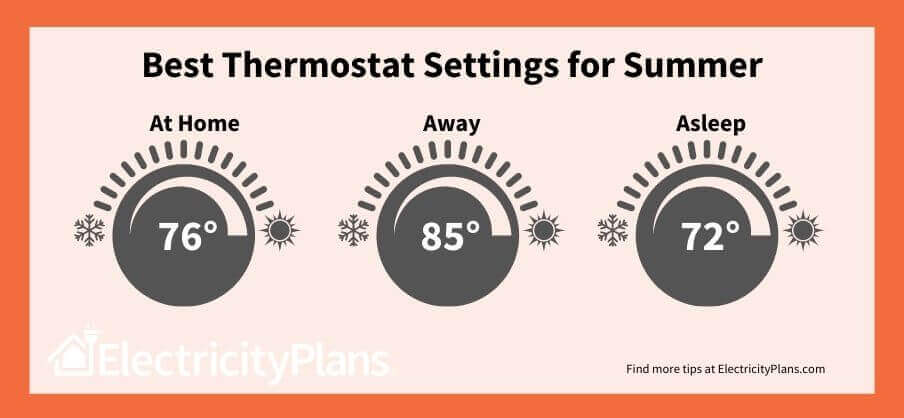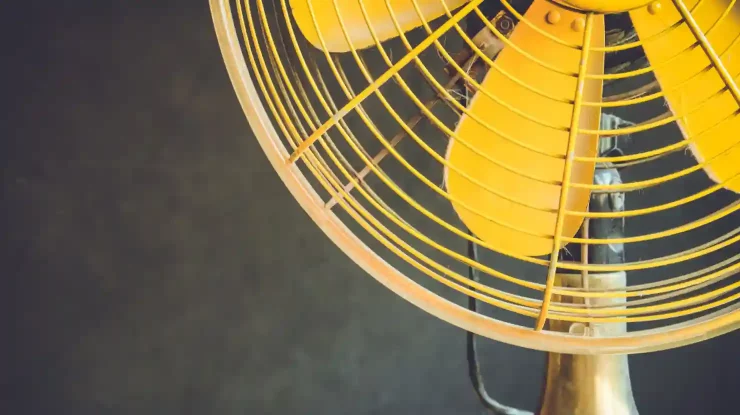For as long as there’s been air conditioning, there’s probably been the debate. Air Conditioners or Fans. Which is best?
When it comes to air conditioning vs. fans, we say both! Air conditioning keeps the air cool in your home. And ceiling fans can create an additional cooling effect that makes you feel up to 4* cooler.
In this article we tell you how air conditioners and fans work to cool your home. And we look at air conditioners vs. fans from two aspects: keeping you cool and keeping your electricity bill low.
Key Takeaways
- Function: AC cools the air and removes humidity; fans move air to help people feel cooler.
- Energy Use: Fans use far less electricity than air conditioners.
- Best Strategy: Use both together—AC to cool the room, fans to circulate air. Then raise thermostat settings by 2-4* for the greatest energy efficiency.
How Does Air Conditioning Cool Your Home?
Your air conditioner works by removing heat from your home and transferring it outdoors. So an ac system doesn’t so much “make” cold air. It removes heat and moisture from the air. Here are the steps of how an air conditioner works.
- The Intake Vent pulls hot air into your HVAC system.
- That air then blows over the Evaporator Coil, which is filled with refrigerant or Freon. The refrigerant absorbs heat and moisture, changing it from a liquid to a gas. The Compressor pumps this refrigerant through the HVAC system.
- Superheated refrigerant gas reaches the Condenser Coil outside. The outside air pulls heat from the refrigerant, lowering its temperature and turning it back into a liquid.
- The cooler refrigerant liquid is returned back indoors to the Evaporator Coil.
- This cycle repeats until the temperature of your home reaches the thermostat set point. Then the thermostat tells your system to shut off.
You’ll notice we didn’t mention the AC Fan. That’s another part of how your HVAC cools your home. Cooled air goes goes into the Air Handler, AC Blower Fan pushes it through the ductwork into your home.
Should you run your AC Fan all the time (On position) or use Auto setting? The auto setting is much more efficient than turning AC Fan Mode to on. Your fan will only run while the HVAC system is cooling the air. Running the fan mode in On keeps the air distributed in the home, but can lead to higher humidity, making the room feel sticky.
Some people “feel” cooler when they can hear the AC Fan running. If that’s you, consider using a small fan instead, or a white noise machine.
How Does a Fan Cool Your Home?
Do fans cool a room or cool your home? No, a fan doesn’t cool your home. It cools the person in the home. Fans cool in two ways, convection and evaporation. (Warning: science alert!)
- Convection happens when heat is carried away from your body by moving air. Your body is producing heat. Move that heat away from you and cool air will take its place. The faster that new air hits your body, the cooler you feel.
- Evaporation happens when you sweat. Even if you don’t see it, there are tiny beads of sweat on your body, leaving through your skin pores. That breeze hitting your skin evaporates moisture and makes you feel cooler.
Is there a certain type of fan that’s best for keeping you cool? Yes. A ceiling fan will cool you down more than a stationary fan, according to the Department of Energy. Ceiling fans circulate the air conditioned air coming from your ceiling vents, meaning cooler air is hitting your skin. That makes for a faster convection and evaporation process.
Since a fan cools the person, not the room, turn it off when you leave the room.

So, on to the main event. What’s better, an air conditioner or fan, for cooling your home? We’ll look at energy usage and cooling abilities.
Ceiling Fan vs. Air Conditioner Energy Use
What’s the energy use of fan vs. air conditioner? And which uses more? The answer is pretty clear, but let’s do the math.
How Much Electricity Does a Central HVAC Use?
The typical air conditioning size for a 2000 square foot home in Texas is 4 tons. A 4 ton AC system with a 16 SEER efficiency rating has a wattage of 3429 watts.
But to calculate the kilowatt hours your AC uses, we need to think about how much it runs.
Your AC will run around 15 minutes, 3 times per hour, for a total runtime of 12 to 16 hours per day. If it’s over 100 degrees outside, your AC could run 20 hours per day.
But assuming 15 hours per day and 3429 watts, you’ll get to this:
Appliance: 4 Ton 16 SEER air conditioning unit
Number of Watts: 3429
Hours used per day: 15
3429 watts X 15 hours = 51,435 watt-hours per day
51,425 watt-hours per day / 1000 = 51.4 kWh per day
51.4 kWh per day X 30 days in a month = 1,543 kWh per month
At an average price of 15 cents per kWh, that AC costs you $231.45 a month to run.
Heat pump HVAC systems are a more cost effective alternative to consider.
How Much Electricity Does Ceiling Fan Use?
We’ll go through a similar calculation for your ceiling fan.
For our example, we picked a Harbor Breeze Bradbury style fan, around $200 at Lowe’s. This is a 48 inch diameter fan, for rooms up to 400 square feet. On its highest speed setting it uses 75 watts.
You’re only using the ceiling fan when you’re in the room. Let’s assume you are using the same type of fan in your living room (5 hours) and bedroom (8 hours)
Appliance: Ceiling fan
Number of Watts: 75
Hours used per day: 13
75 watts X 13 hours = 975 watt-hours per day
975 watt-hours per day / 1000 = 9.75 kWh per day
9.75 kWh per day X 30 days in a month = 292 kWh per month
At an average price of 15 cents per kWh, that fan costs you $44 a month to run.
So obviously from this? It’s cheaper to run a fan than an AC.
But a fan can only do so much to keep you cool. For example, once it’s hotter than 95 degrees in your home a fan actually makes you feel hotter!
TIP: Use our energy usage calculator to do the math for you! Just enter watts, hours used and price per kWh. We’ll calculate the daily, monthly and annual cost.
Conclusion: Is an Air Conditioner or Fan the Best Way to Cool Your Home?
The best solution to the question of air conditioning or fan? Use both.
- Set your thermostat to the recommended settings for summer cooling.
- Use a ceiling fan or portable fan to create a breeze in the room you are using.
- Shut off the fan when you leave the room. Air conditioning cools the air in your home. A fan only cools the person in the room, through evaporation. So shut it off when you are done.
Follow the best thermostat settings for summer and you’ll save on your electricity bill.

How Long Does it Take to Cool a House from 80° to 72°?
Bonus content! If you are trying to save money on your electricity bill, you’ll want to adjust your thermostat so your HVAC doesn’t run as long. Here’s one way to keep cool in your home but cut your electricity usage.
Let’s say you are keeping your house a 80 degrees when you are away from home. To get your temperature to 72 degrees when you get home, it will take 2 hours and 24 minutes.
A better approach? Drop your thermostat to 76 degrees instead of 72 degrees. Then, use a ceiling fan to stay cool. According to Energy.gov, the wind chill effect of your fan will make it feel 4 degrees cooler, i.e. make 76 degrees feel like 72.
We put that to the test to save electricity in a home office. With the thermostat at 76* and a ceiling fan directly above the desk, our staff member had to get a sweater.
What would it mean if you cooled your house to 76 degrees instead of 72 degrees? A lot of energy savings. Above, we told you that it would take 2 hours and 24 minutes to drop your house from 80 to 72 degrees. If you set the thermostat at 76 degrees? It would take just 72 minutes.
That’s half the time. And much less money to cool your home. Once you’re at 76 degrees, use a fan in the room you are in, to create an evaporative breeze.
